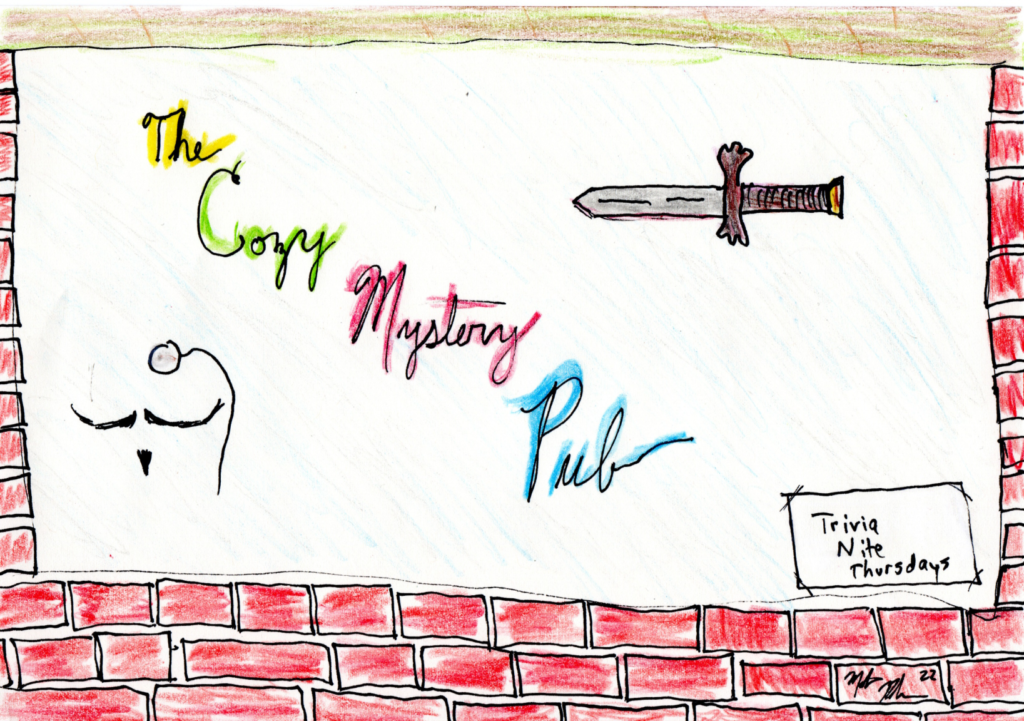
Agatha Christie is the master of detective fiction. More accurately, she is the master of all fiction: Christie’s books have sold two billion copies, placing her at the very top of the heap. Yes, her sales numbers tower above Stephen King and J.K. Rowling and J.R.R. Tolkien. Please do not take this as me implying that financial success equals quality. Rather, I find it fascinating that an author who passed away 48 years ago has still outsold mega franchises with her detectives Miss Marple and Hercule Poirot.
We’ll talk about Miss Jane Marple and other Christie characters on a later day. Today’s focus is Hercule Poirot. I’ve had several people express interest in Death on the Nile (2022), the much-delayed second Poirot adaptation from director/actor Kenneth Branagh. I missed his Murder on the Orient Express (2017) when it initially released, but I am a lifelong fan of Christie’s works and adaptations, so I knew that I’d eventually get around to it. I finally did a few weeks back, and it was very enjoyable. This got me thinking that maybe not everyone has entire bookcases in their house dedicated to cozy mysteries. Maybe it is worth taking a few minutes to talk about Hercule Poirot as a primer for those who only know him from that recent film.
This sent me on a second flight of fancy. In addition to writing about Poirot in anticipation of Death on the Nile’s release, I should write a series of primers on famous cozy detectives! And just like that, our Cozy Mystery Pub has opened for business. Look for additional features on Benoit Blanc before the release of Knives Out 2 later this year, and we’ll also check in on Jules Maigret and Brother Cadfael and Chief Inspector Barnaby and other luminaries as I get the itch.
HAIR-kyül PWAH-ro
Hercule Poirot appears in fifty-some Agatha Christie stories from 1920 to 1975. Poirot is a Belgian detective living in postwar England, having fled his native land as a refugee during World War I. However, Christie’s stories take him all over the world. Within the fiction, Poiriot is world-famous for solving high-profile cases, but he also aids the local constabulary on crimes in London. Most of the famous Poirot stories are set in this period between the World Wars, but Christie continued to write him into contemporary settings up to the end of her life, with the detective increasingly out of place among the mods and other youth cultures of the 1960s and onward.
Poirot is a tiny man and is famously mustachioed. Portrayals of him on television and film have gone in every direction imaginable in adapting his famous mustache, from the naturalistic (Peter Ustinov) to the absurdist (Kenneth Branagh). But you’ll know Poirot before you know him thanks to his grooming and his ‘stache. He is also fastidious about the preparation of his food and has a sweet tooth. His defining personality trait is likely that he does not like to be inconvenienced.
Physically, his small stature and careful appearance keep him out of the realm of pistols and fisticuffs and more in the realm of the thinker. Unlike Jules Maigret or some iterations of Sherlock Holmes, Poirot is not throwing punches or engaging in a foot chase; instead he notices anything askance or odd about a crime scene and files it away, quietly assembling the entire crime as more details emerge. He plays it close to the vest, and is often perturbed when he has to spell out everything for those who can’t mentally keep pace. His reliance is on his little grey cells, to use the famous term.
The most famous story is also the most adapted, that of the Murder on the Orient Express. It is one of those stories whose title is so famous that people who will never read a detective story have still heard of it. Its twist is similarly famous, although I find it baffling that the story is so adapted, given how its whodunit breaks the conventions of the detective story. It is generally advisable to establish expectations before you break them.
Books
I confess to being less well-read in Agatha Christie than I am in other detective series. I have read dozens of her stories across my lifetime, but I only own a handful of books. She, like Terry Pratchett, is someone whose books are always on my radar when I visit Half-Price Books or other used bookstores. I plan to dig in on Miss Marple stories before I do a primer on that character.
POWER RANKINGS
A lot of people have played Poirot over the past century. I have not seen every portrayal, but for those that I have, I think a power ranking is in order. We’ll talk adaptations, then give them a letter grade based on their facial hair, their accent, and their overall performance.
DISCLAIMER: My knowledge of the Belgian accent comes solely from the Muscles from Brussels, so I’ll be grading based on how much each accent took me out of the story rather than on its authenticity.
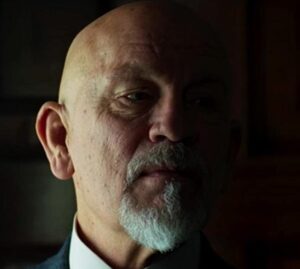
#7. John Malkovich
The ABC Murders (2018, Amazon)
This adaptation felt like a misfire on so many fronts, not least of which was the casting of veteran Chicagoan John Malkovich as the Belgian detective. Malkovich brings his characteristic coiled rage to the character, but it’s just a damned slog. This iteration of Poirot is haunted by his personal traumas of World War I and has been passed by in his profession, which admittedly is not uncommon in the later Poirot stories. He putters about in sooty, grey-ass London, as everyone he knew has retired or died. Mr. Holmes (2015) successfully applied a similar conceit to a retired Sherlock Holmes. But in The ABC Murders, the combination of a haunted past (before he becomes a famous detective) and a bitter emergence from retirement (after he stopped being a famous detective) means that we never get any of the fun detecting from Poirot… you know, the reason one generally watches a detective story.
Rupert Grint (Ron Weasely of the Harry Potter thing) is the highlight of this miniseries, and one can also spot Yennefer of Vengerberg (actress Anya Chalotra) before she joined The Witcher.
Mustache rating: D-. He has a pointy goatee! And the movie even has the gall to make Poirot dye his mustache black with shoe polish and then have characters laugh at him for it. This miniseries is truly a joyless experience.
Belgian accent: C-. Malkovich’s mannerisms and performance suggest a teutonic stiffness, but all I hear is a Midwestern accent with some German stank on it.
Overall Poirot: D. You don’t need to see this one unless you are a Rupert Grint completist (again, he’s quite good in it!).
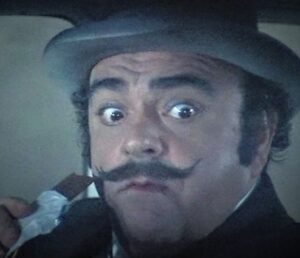
#6. James Coco
Murder by Death (1976)
This is an honorable mention in the history of Poirot portrayals, much like how Galaxy Quest (1999) is spiritually a Star Trek movie. (And “spiritually” the fourth-best Star Trek movie in the eyes of this writer. –Ed.) This loving but only occasionally funny satire of cozy mysteries is fascinating for its cast and attention to detail about famous detectives, but the humor is scattershot and the direction poor. Coco plays Milo Perrier, the movie’s send-up of Hercule Poirot. I find his performance quite enjoyable. He nails all of the expected traits—from impatience to being a fiend for sweets—and does so with admirable gusto.
Mustache rating: B-. It looks real, or as least sufficiently fake that I didn’t care.
Belgian accent: B-. It feels like a French accent but his every other sentence is an insistence that he is not French.
Overall Poirot: C+. Peter Sellers is in yellowface in this movie. It is painful. Yes, this is Neil Simon calling attention to the shameful yellowface history of Charlie Chan movies, but it doesn’t matter when the jokes are at the expense of the character. The rest of the cast is incredible, including Truman Capote and Alec Guinness and Maggie Smith and David Niven. Eileen Brennan and Peter Falk steal the show. So it is high praise that Coco’s Milo Perrier holds his own among these luminaries of the screen. So if you can get past the Sellers performance, Murder by Death is a fun time.
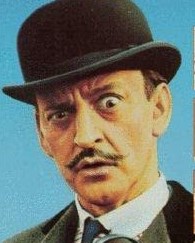
#5. Tony Randall
The ABC Murders / The Alphabet Murders (1965)
I’ve not seen this in many decades, but from what I recall, it was not a particularly noteworthy film. I just have a fondness for Tony Randall from his stint on The Odd Couple television series and he has a decent mustache. The movie is half a satire of detective stories, and filmed like a stage play to boot, so it is more stilted than anything else on the list. Still it has so good supporting performances (Robert Morley, Julian Glover) and the whole movie is available fo free on YouTube.
Mustache rating: B-. The facial hair is precisely groomed but pencil-thin. Points for it being real but demerits for its lack of flamboyance.
Belgian accent: F. Tony Randall does a British accent while winking at an Austrian accent. I could feel myself morphing into Jack Klugman and rolling my eyes.
Overall Poirot: N/A. I should give it a rewatch.
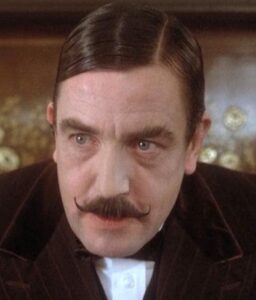
#4. Albert Finney
Murder on the Orient Express (1974)
It pains me to rank Finney so low on this list, as I like his portrayal. But there is stiff competiton for the top three slots. Finney brings a little madness to Poirot absent in the other portrayals, most notable in how he has a glint in his eye as he waits for other people to catch up to him mentally. He also has a literal glint in his eye because this is the most garishly lit of the Poirot films. The sets are over-lit, perhaps to suggest the snowbound setting, but this makes the film seem overexposed. The art deco fixtures and crystal really shine.
I think the conceit is at odds with the subdued cast. This film not being campy is surprising, since it includes hams like Martin Balsam, Ingrid Bergman, Anthony Perkins, and Michael York. Even Finney can go big. (The cast is rounded out by the always-excellent Sean Connery, Vanessa Redgrave, Lauren Bacall, and John Gielgud.) The overall tone is a little quiet and stately, but I do very much like the film.
Mustache rating: A+. It looks real and quite silly. I love his mustache net that he wears when he sleeps.
Belgian accent: B. His accent is not distracting in conversation, but it veers a little toward Sigmund Freud when he gets wound up.
Overall Poirot: B. Finney is a great Poirot in a pretty good movie. No complaints.
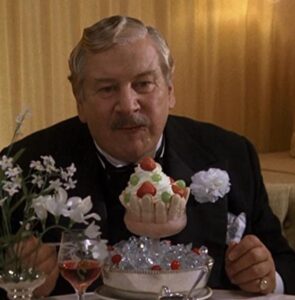
#3. Peter Ustinov
Death on the Nile (1978), Evil Under the Sun (1982), Thirteen at Dinner (1985), Dead Man’s Folly (1986), Murder in Three Acts (1986), Appointment with Death (1988)
Ustinov is an excellent Poirot. You most likely know his voice more than you know him, as he was the leonine Prince John in Disney’s Robin Hood (1973). He is a large fella, and that physicality influences our perception of the character. Whereas the tiny Suchet must command the screen through his manias, Ustinov’s Poirot fills the frame. Such a Poirot would seem larger-than-life when meeting fans of his detective reputation because he is literally larger than anyone else he encounters. But fear not: the quirks are still there. This Poirot is quite fussy about his hair and clothing, and his little grey cells are no less honed than other iterations of the character.
Death on the Nile is a fun story, as it has so many of the trademarks of the cozy mystery: the loathsome wealthy, working-class people with shady backgrounds, a confined setting, love triangles, and murders to cover up other murders. I do not recommend the film if you plan to go cold into 2022’s Death on the Nile. But if spoilers do not bother you, this is a fun film. And Ustinov’s second theatrical Poirot is Evil Under the Sun, which was directed by Bond legend Guy Hamilton, who helmed Goldfinger (1964), Diamonds Are Forever (1971), and The Man with the Golden Gun (1974)—three of my top ten Bonds.
I have not yet seen the other four Ustinovs, as they were made-for-TV movies from the pre-Internet days, so their streaming availability is limited.
Mustache rating: C+. Clearly a real mustache but far too subdued. His hair, conversely, is coiffed and oiled to perfection.
Belgian accent: A. Ustinov is just using his natural British accent with a little French on it. But he had one of those legendary voices that would be pleasing even if he were reading the phone book, so it works.
Overall Poirot: B+. Very different than the other portrayals of the character, but that contrast makes it notable.
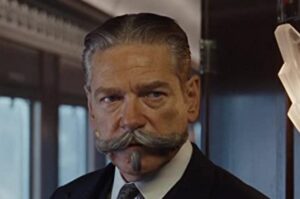
#2. Kenneth Branagh
Murder on the Orient Express (2017), Death on the Nile (2022)
I am just as surprised as you are that Branagh is above Ustinov on this list. However, I was fully charmed by his film. It certainly helps that the movie was shot in 65mm and the sets are sumptuosly dressed. This is a good-lookin’ movie from start to finish. No other adaptation on this list is remotely in its ballpark. And those who know me know my love for well-executed, good-lookin’ genre films.
Branagh plays the Poirot hits—food, fussiness, distinterest in wasted time—but he does the best at mixing them with a little world-weariness. An early scene in Murder on the Orient Express exemplifies this, as Poirot explains to a local constable that it is exhausting to go through life hyperfocused on imperfections and clues. But, and he explains this in a later scene, it also means that things perfectly executed are of immense enjoyment to him.
This adaptation followed the precedent set by the earlier Murder on the Orient Express and continued by Ustinov’s films in having an incredible ensemble cast: Daisy Ridley, Michelle Pfeiffer, Judy Dench, Leslie Odom Jr., Josh Gad, Johnny Depp, Penelope Cruz, Olivia Colman.
Mustache rating: F and A+. Branagh sports a truly epic Van Dyke in this film. It dwarfs his bird lips to the extent that a Groucho Marx mask would be more subtle. However, I appreciate the audacity of it, and I’d watch a behind-the-scenes documentary about the mustache selection process.
Belgian accent: B+. The accent never pulls me out of the story. His Poirot is an odd duck and he embraces it.
Overall Poirot: A-. Branagh is a charismatic actor, the most so of this list. That movie star panache goes a long way in making it believable that Poirot is a world-famous detective. He also sells the quiet intelligence and makes it seem like Poirot is always laughing at a quiet joke. I am excited for the new film.
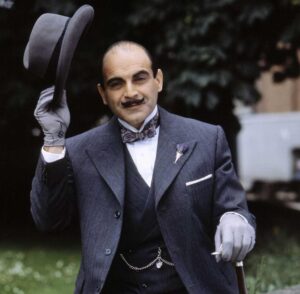
#1. David Suchet
70 episodes of Agatha Christie’s Poirot (1989–2013).
And then there was one. David Suchet played the detective across three decades of BBC series. The stories are perfect encapsulations of the cozy mystery aesthetic: the friction between working-class and idle-class, crimes of greed, crimes of passion, secrets, etc. Poirot carves a niche for himself in postwar England by foiling the most elaborate of crimes, and every mystery is solved within an hour-and-a-half.
US procedurals became gross and upsetting after the advent of Dick Wolf’s Law & Order (1990), especially the prestige TV apotheoses of the form: Mare of Easttown (2021–) and True Detective (2014–2019), so it is common to assume that all procedurals are equally unpleasant. Let Suchet’s Poirot be a balm to your senses, a palate cleanser, a lowkey way to zone out after the stresses of the modern world.
Mustache rating: A. This is a very silly, heavily oiled, precisely groomed mustache. It is perfectly applied to the most bespoke of Poirot adaptations.
Belgian accent: A. I compare all of the other accents to this one. I don’t know if it is Belgian, but it is Poirot for me.
Overall Poirot: A+. Suchet’s portrayal is the defining one and everything afterward must be compared to it. Just like Ian McKellen versus whoever plays Gandalf in a future Tolkien adaptation, this is the baseline. He is tiny and fastidious, he is hyper-intelligent and put out by explaining things to other people. He just wants to get paid and eat pastry. He’s a perfect cozy mystery protagonist.